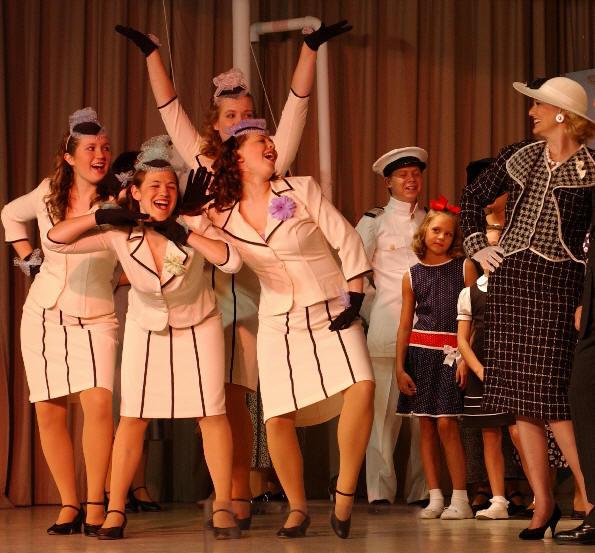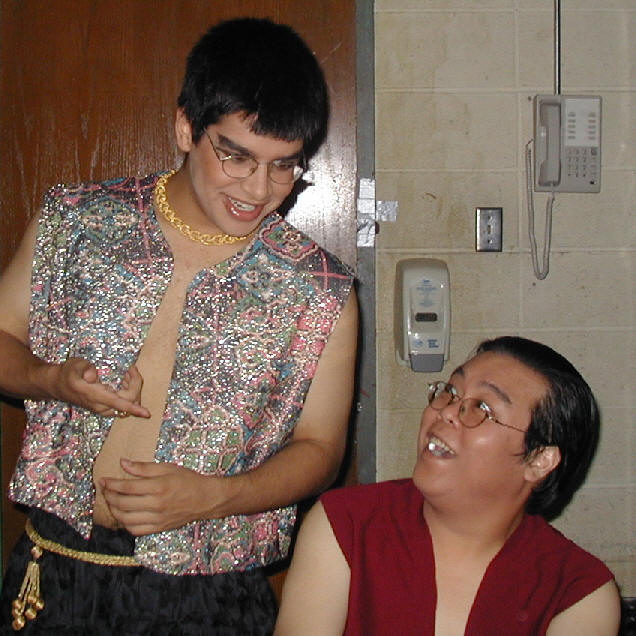Things to Know
This information may be especially helpful to new members of the Archangel Players. It is intended to provide as much basic information as possible, so that everyone is brought up to speed quickly with how our group works. If you're new to musical theater in general, then you'll want to start with the General Information section. Otherwise, you can skip down to the Players Information section.
General Information
- The Participation Experience: The experience of participating in an Archangel Players production (or any theatrical production, for that matter) is supposed to be fun and educational. We want everyone to have a great time, but we must remember that putting on a production of this size requires a considerable amount of work from everyone involved.
 What is expected of a performer: You will be expected to attend all required rehearsals and to show up on time ready to get to work. In addition, it is your responsibility to learn and practice your dialogue, music and staging. In some cases, this means homework. During rehearsals, you can expect to have blocks of time when you are not actively working on stage. These are opportunities to contribute to the show in other ways, such as studying your lines or helping with set, costumes, or business functions of the show. If none of those apply, then watch and listen (quietly). You can learn very much from watching the director work with other actors. Who knows... you might be a director yourself some day!
What is expected of a performer: You will be expected to attend all required rehearsals and to show up on time ready to get to work. In addition, it is your responsibility to learn and practice your dialogue, music and staging. In some cases, this means homework. During rehearsals, you can expect to have blocks of time when you are not actively working on stage. These are opportunities to contribute to the show in other ways, such as studying your lines or helping with set, costumes, or business functions of the show. If none of those apply, then watch and listen (quietly). You can learn very much from watching the director work with other actors. Who knows... you might be a director yourself some day!
 What you can expect to receive: In return for your investment of time and effort, you will receive an experience that will last a lifetime. Ask any performer. He or she will have plenty of fond memories of his or her earliest stage appearances. A 2003 Time Magazine survey found that the greatest fear of 40% of Americans is public speaking. (This more than doubles the number of people who fear death the most!) By participating in theater, you will become accustomed to appearing in front of an audience and be able to conquer these fears very quickly. This can help to improve your confidence and self-esteem. Best of all, public speaking skills are highly sought after in all walks of life. When you stop and think about it, those who don't have theatrical experience are still afraid to speak in public in their professional lives... and are only too happy to pass important opportunities on to someone else.
What you can expect to receive: In return for your investment of time and effort, you will receive an experience that will last a lifetime. Ask any performer. He or she will have plenty of fond memories of his or her earliest stage appearances. A 2003 Time Magazine survey found that the greatest fear of 40% of Americans is public speaking. (This more than doubles the number of people who fear death the most!) By participating in theater, you will become accustomed to appearing in front of an audience and be able to conquer these fears very quickly. This can help to improve your confidence and self-esteem. Best of all, public speaking skills are highly sought after in all walks of life. When you stop and think about it, those who don't have theatrical experience are still afraid to speak in public in their professional lives... and are only too happy to pass important opportunities on to someone else. 
 You'll have a great time with these people! In many cases, lifelong friendships are started in community theater groups. Each new show brings new surprises and experiences that help to reinforce these bonds of friendship.
You'll have a great time with these people! In many cases, lifelong friendships are started in community theater groups. Each new show brings new surprises and experiences that help to reinforce these bonds of friendship.
Who's Running the Show?
Performing on stage is tons of fun. But at the same time, a lot of people are working behind the scenes to assure a successful production.
- Producer: The Producer's job is to manage the financial aspects of the production and assure that logistically, everything is in place. This usually involves overseeing fundraising activities, facilities planning, working out royalty contracts with the music library, etc. The best producers are skilled at delegating such tasks.
- Director: The Director is the person who brings all of the artistic pieces of the show together. The presentation of the story being told is the director’s interpretation of the written word in the script. At a minimum, the Director works with the actors to learn their lines and blocking. But (s)he might also help the actors interpret some of their lines and discuss their motivation in a scene. Often, the actors gain new insights into their roles and ultimately become better at their craft.
- Assistant Director: The role of the Assistant Director is to help the Director with his/her job. Duties might include following the script to verify the accuracy of the actors' lines and blocking, and perhaps even running a rehearsal if the Director is unavailable. The Assistant Director also works as a "buffer" -- answering questions from the actors, taking attendance, etc. -- so that the Director can concentrate on the show itself.
- Music Director: The Music Director makes sure that all of the cast members know the music from the show by rehearsing them, usually in separate music-only rehearsals. The Music Director often conducts the orchestra during performances.
- Choreographer: The Choreographer is responsible for any movement that takes place on stage that is set to music. The Choreographer works with those actors who have dancing ability to provide active movement, especially during instrumental interludes.
- Set Designer: The Set Designer is responsible for designing the scenery for the stage. (S)he works closely with the Director throughout the preparation of the show to assure that the set is consistent with the Director's vision.
- Costume Designer: The Costume Designer is responsible for planning and executing a costuming scheme to complement the Director's vision of the show. This does not necessarily mean the Costume Designer is a seamstress or tailor. (S)he will acquire costumes by whatever means (make, borrow, rent) and usually has volunteer help for what sewing is done. The most important work done by the Costume Designer is the up-front planning and research. (S)he will work with the Director and Set Designer to decide on the best color schemes for the show; decide on the level of complexity in the costuming; and research what people wore in different historical periods and parts of the world. Appropriate costumes are critical to a successful production.
- Prop Master: This individual works with the director, identifying the items (other than costumes and scenery) that are called for to tell the story. Telephones, candlesticks, guns, even fake money are examples of props that an actor might need on stage.
- Stage Manager: The Stage Manager takes control of the show once performances have begun. The Stage Manager is responsible for organizing the backstage chaos in order to ensure a successful performance on stage. This includes directing stage hands in handling props and scenery, making sure actors are in position for entrances, and perhaps calling lighting and sound effects queues.
- House Manager: The House is the part of the theater where the audience sits to enjoy the show. (S)he, then, is responsible for keeping the seating area presentable, double-checking restroom supplies, etc.
Glossary of Theatrical Terms: A very good interactive theatrical glossary can be found at TheatreCrafts.com.
Archangel Players Information
- Auditions: For a singing audition, it is by no means necessary to sing a song from the show, or from any show, for that matter. People have auditioned with pop songs, church hymns and even "Happy Birthday." However, if you hope to land a lead or featured role, it may help to audition with one of that character’s songs. For live accompaniment, we will need you to bring sheet music. You may choose instead to bring an accompaniment on tape or CD.
- The budget for an AP production regularly exceeds $10,000. As a group, our financial goal is to at least break even, if not earn a thousand or two for the parish. Usually, tickets finance about 50% of the production. The remainder comes from ad revenue. We strongly encourage all participants to keep ad forms handy and to solicit donations from employers, in addition to your favorite restaurants, styling & tanning salons, insurance agents, lawyers, politicians, etc. (Forms are available at the Insider's Corner.) Although we do a bulk mailing to area businesses, the message is much stronger coming from a regular customer.
- If a company doesn’t accept an ad form, ask if you can place a poster in their window to inform the public.
- Each cast member must submit some flat fee (usually $25) for participating in the show. Fees are waived if you sell an ad for the same amount.
- Please invite friends and family to see the show! All too often, people who would love to see the show wind up missing it simply because they weren’t informed.
- At the first meeting, you should receive whatever rehearsal material (script, vocal score) you will need. You must return this material in good condition. Material can be returned to the librarian any time before the closing performance, once it is memorized. If material issued to you has been lost, you will be required to pay for its replacement. (The fee varies, but usually runs around $15.)
- If you need to make notations in the material please do so in pencil. We are charged by the music library if they discover notations or markings when the material is returned.
- You must erase any notations before returning the material to the librarian.
- Ideally, the rehearsal schedule is available at audition time so that you have a chance to let us know about any expected absences. At the first meeting, you should be provided with a rehearsal schedule and list of character appearances. (These are also available at the Insider's Corner.) Using this information, you can determine which specific rehearsals you are expected to attend. Of course, rehearsal attendance is critical for a successful performance. Our most enthusiastic members will avoid scheduling vacations during rehearsals. This may be a requirement for some major roles.
- Chorus rehearsals are usually held once or twice a week for the first several weeks of the show. Your rehearsal schedule will tell you when attendance at other rehearsals is required.
- Alcohol is strictly forbidden in the gym during all Archangel Player activities. (We certainly do our share of imbibing -- elsewhere.)
- At your first staging rehearsals, you will learn your blocking.
- By the last couple of weeks, we should have a running show with lines, blocking and songs. We then begin to layer in other elements -- props, costumes and tech (lights, sound). Each new element adds another challenge for the performer. Therefore, a solid foundation -- knowing lines and blocking extremely well -- is important for dealing with these new hurdles.
- Our set designer can always use lots of help to build the best set possible.
- Costumes present a wide range of challenges from year to year. This may involve tasks other than sewing -- buying material or pre-made costumes, adding trim and accessories, etc. Being handy with a needle and thread helps, but isn't necessarily a requirement to help out with costumes.
- A list of props will be generated during rehearsals. Anyone buying materials for props or costumes should be sure to have a tax exempt letter handy, as the church does not pay sales tax.
- Tech Sign-up must be done early enough for names to be included in the program. This includes set construction, lighting and sound, House Manager. Generally, 3 weeks prior to performance is our target for collecting these names.
- Tech weekend occurs one week before performance. Much of the final set construction and painting goes on this weekend, along with getting lights and sound in place. Saturday is the primary work day, although we usually begin on Friday. All adults in the production (and parents) are encouraged to help out.
- We usually need a volunteer to videotape a performance, if we have contracted for the rights. If you’re handy with a camera and would be willing to handle a performance, please sign up!
- Performances traditionally occur the second or third weekend in July. They are usually at 7:30 on Thursday (if the run is for 4 performances), Friday and Saturday and 2:00 PM on Sunday. Your call time (expected time of arrival) will usually be 90 minutes prior to performance. Most people prefer to put on make-up and costumes at school, where we generally arrange for the use of classrooms or the cafeteria. (Costume changes can be done in the restrooms.)
- After each performance, we traditionally hold a cast party at a cast member’s house. This is a cover-dish affair, and we usually have a sign-up sheet by the spotlights during the last week of rehearsal. These parties are lots of fun! We hope everyone (including parents, of course) can attend. It’s a great opportunity to unwind after a performance and to have some fun singing songs from past shows. While alcohol is available, we are very careful about not allowing anyone under 21 to drink.
- After the last performance (and before the party), we are able within a couple of hours to strike (remove) the set. All adults in the cast are expected to help in striking the set. (Parents, too.) Children can help by doing lighter cleaning tasks, erasing notes out of scripts, etc. The cast party does not begin until the set has been struck! If you do not wish to help in striking the set, that’s OK… as long as you don’t attend the cast party afterwards.